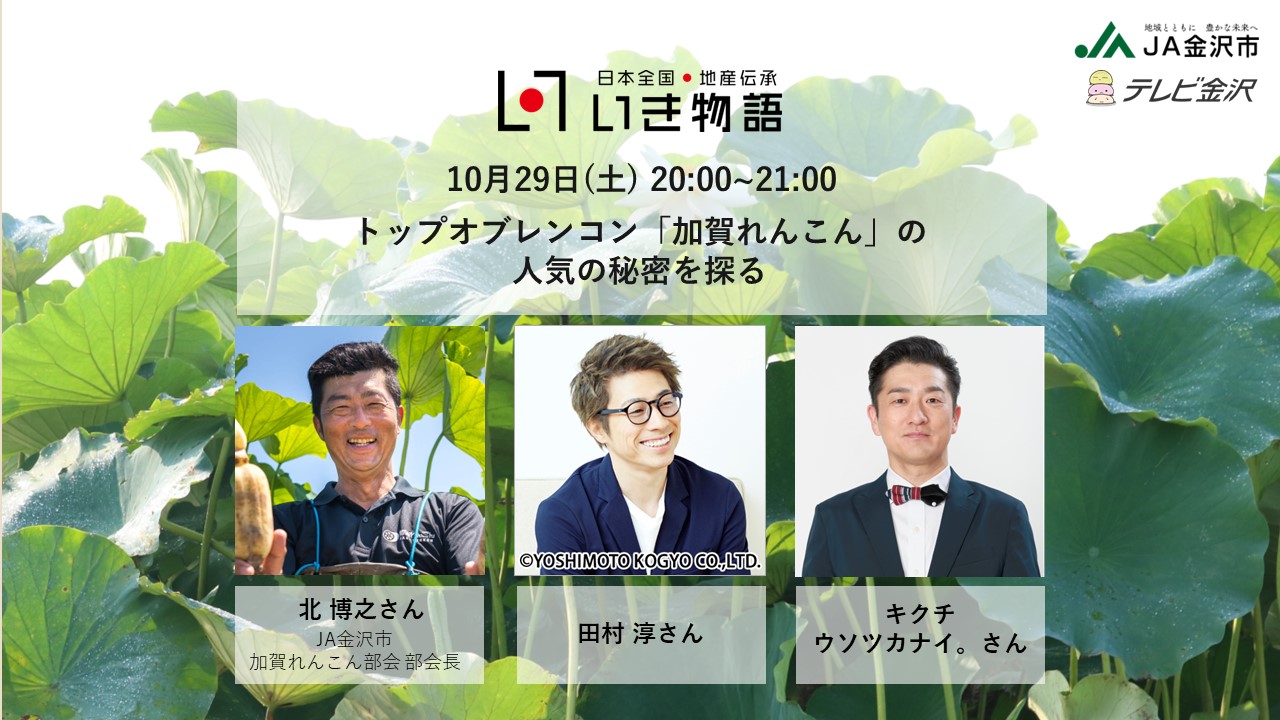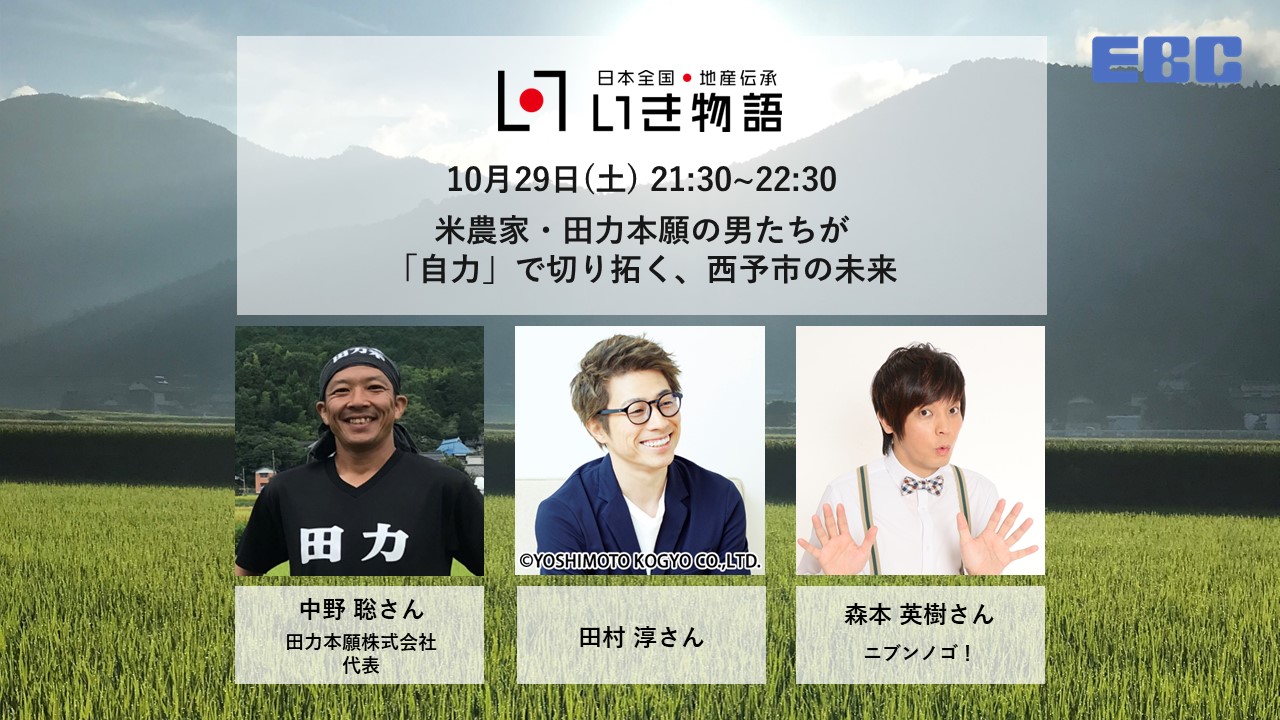A New Kind of Sake Production That Makes You Want to Visit: The Endeavors of Lagoon Brewery
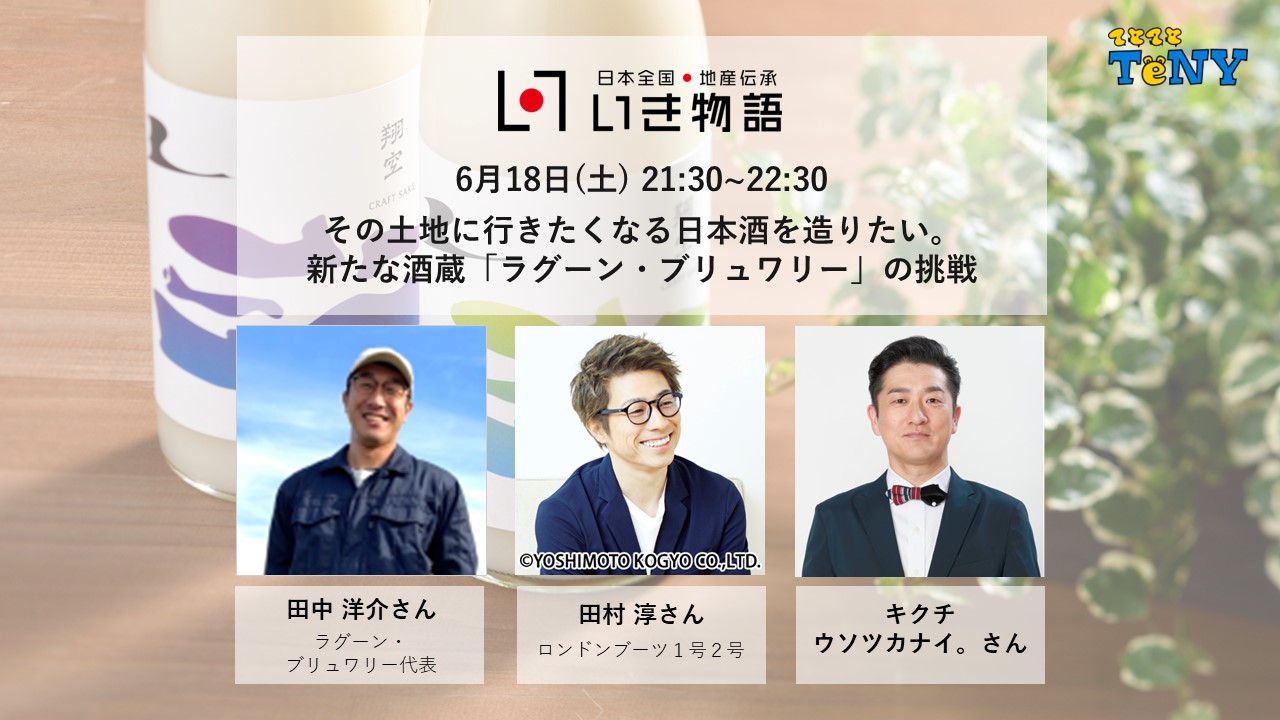
Many foods and traditional crafts created with extraordinary enthusiasm and commitment exist in the rural areas of Japan. These products are, of course, of the highest quality, but behind them is also the conviction of the manufacturers and the stories that have resulted in their present state.
Ikimonogatari: All Japan Local Productions and Folklore events will introduce traditional crafts and specialty products that can only be found in local regions and convey the charms of those rural areas by sending broadcasters directly to the source to dig deep into the activities of the people there.
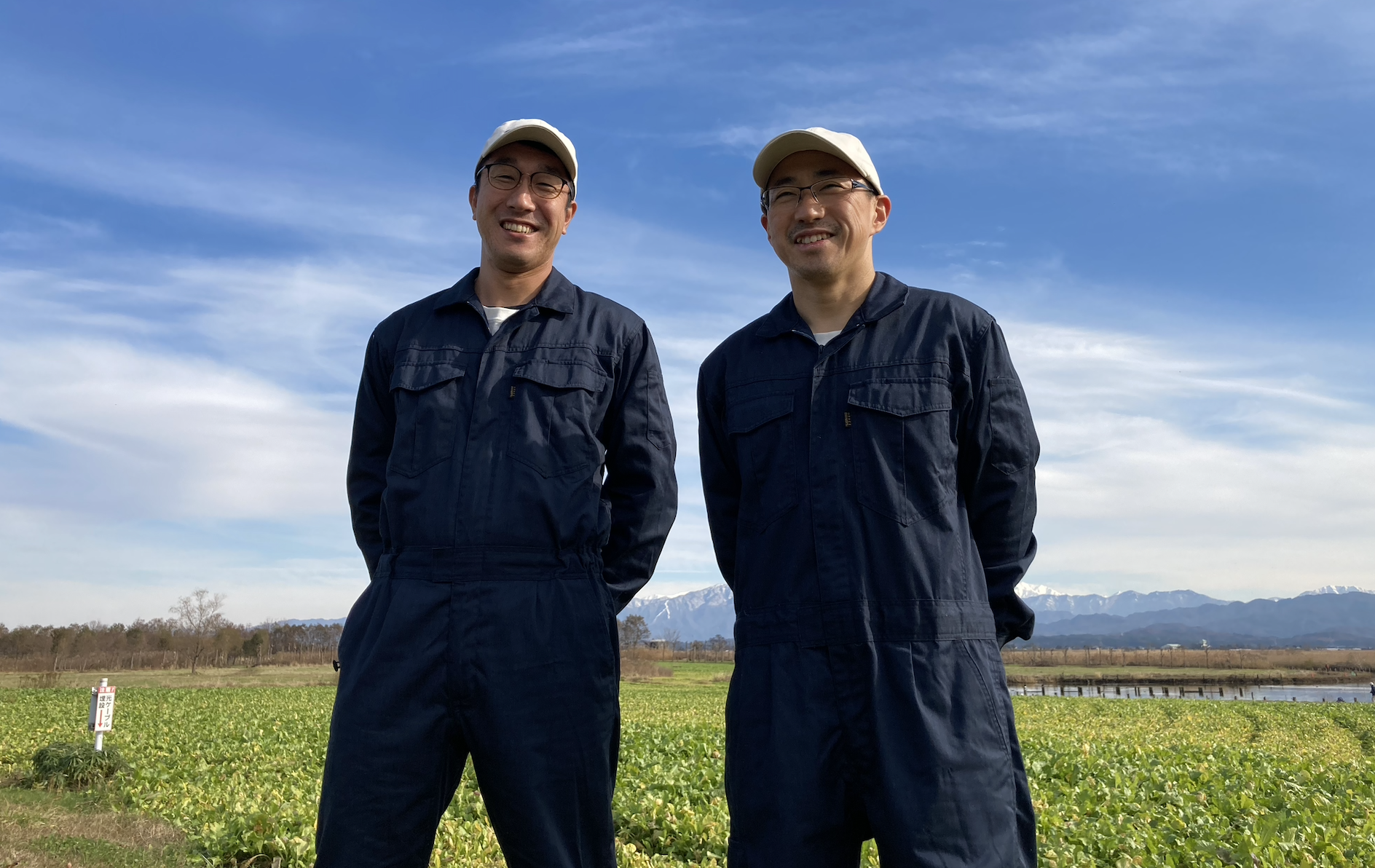
※Left: Yosuke Tanaka
The Featured Guest for This Event: Mr. Yosuke Tanaka, Representative of Lagoon Brewery
Lagoon Brewery stands on the banks of Fukushimagata Lagoon in the northern part of Niigata Prefecture. It's a new brewery, having just begun production after receiving their sake license in late 2021.
Only six months after beginning brewing, they are working to establish a new style of sake production, brewing a variety of kinds of sake, including unrefined sake for domestic use, nihonshu sake for international export, and more.
During this event, Yosuke Tanaka, founder of Lagoon Brewery, joined us to talk about his passion for sake brewing.
Special guests: Atsushi Tamura of comedy duo London Boots Ichi-go Ni-go and Hideki Morimoto of comedy trio Nibunnogo.
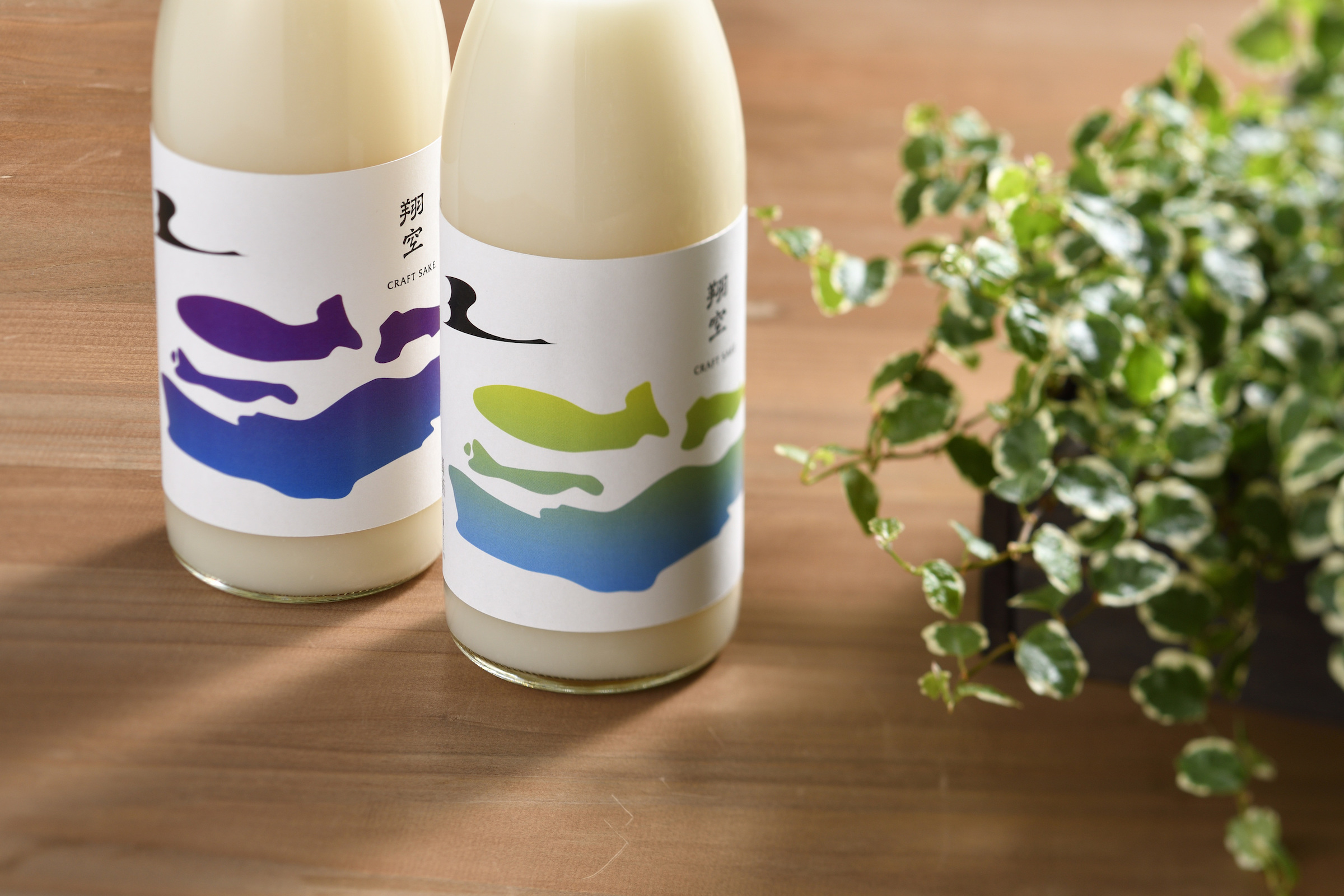
Kikuchi: My name is Kikuchi Usotsukanai, I am a comedian at Yoshimoto Kogyo, and I will be the moderator for this event. This time on Ikimonogatari, the theme is "A New Kind of Sake Production That Makes You Want to Visit: The Endeavors of Lagoon Brewery." It's a rather nice title, isn't it.
Tamura: Lagoon Brewery is a Western-style name. I feel like the chief brewer must be someone young.
Kikuchi: Mr. Atsushi, how are you with sake, usually?
Tamura: I drink a lot of sake.
Kikuchi: I had heard that you drink a lot of alcohol, but what about nihonshu sake?
Tamura: I drink a lot of shochu now, but before I got into that I drank a lot of nihonshu.
Kikuchi: I see.
Tamura: I have around 100 sake cups in my house. I didn't get one out today though. It has a nice name, so I thought I'd drink from a Baccarat glass.
Kikuchi: It is stylish. I think sake will go well with it, too.
Tamura: When I saw the bottle (of sake), I just felt like a sake cup wasn't a good match.
Kikuchi: I'm glad to hear that. I think we'll get to hear about the design of the bottles today, too.
Now, I would like to introduce the manufacturer. This is Yosuka Tanaka, representative of Lagoon Brewery. Thank you very much.
Tanaka: Thank you.
Kikuchi: As Mr. Atsushi said, you are quite young.
Tamura: You are young. I think it'll be good for the future of Japan if young brewers like you are active not only in sake breweries, but also in a variety of other fields. I look forward to seeing it.
Kikuchi: That's a great thing to say. Mr. Tanaka, you'll have to be careful now that the bar has been raised so high. [laughs] I'm looking forward to it!
Right off the bat, I have a question I'd like to ask. What kind of brewery is Lagoon Brewery?
Tanaka: First of all, it's located in Kita-ku, Niigata City, Niigata Prefecture. It's close to Yamagata and Fukushima, but also not too far from central Niigata City. We make our sake in a landscape that spreads out after a drive of about 30 to 40 minutes.
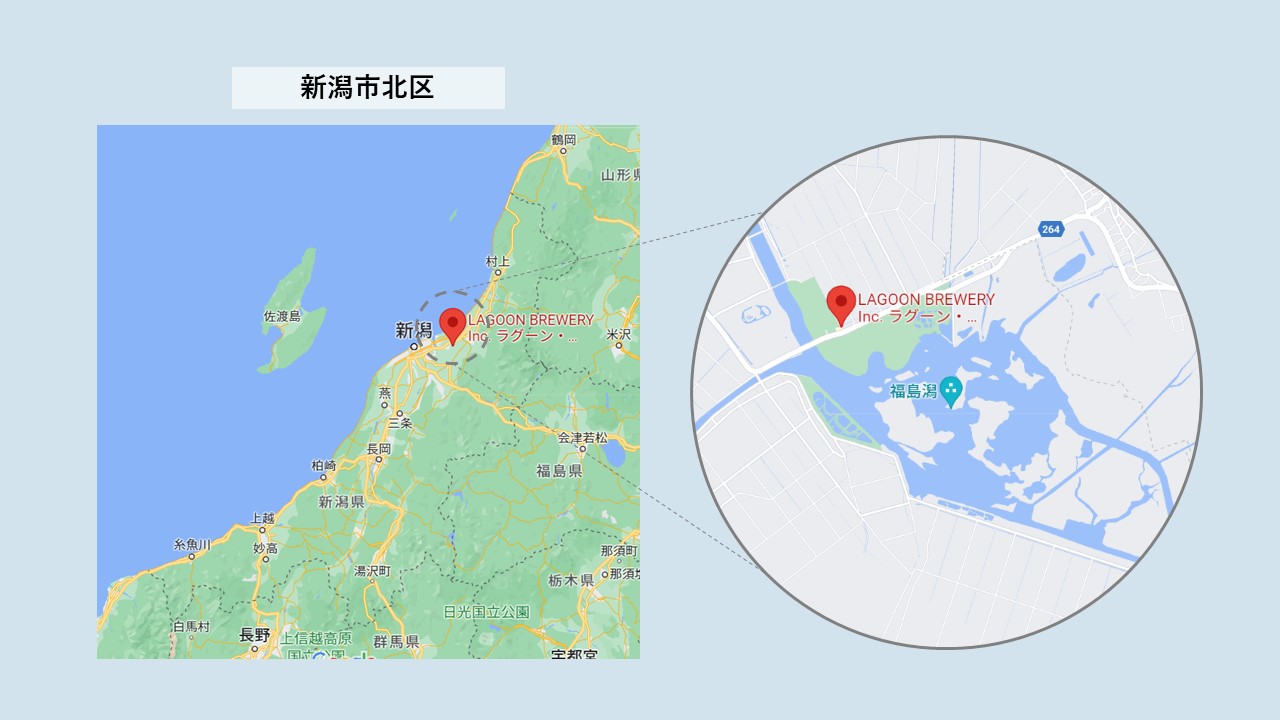
Tanaka: This is the landscape around Fukushima Lagoon. There is an observation platform nearby, and this is the view from there.
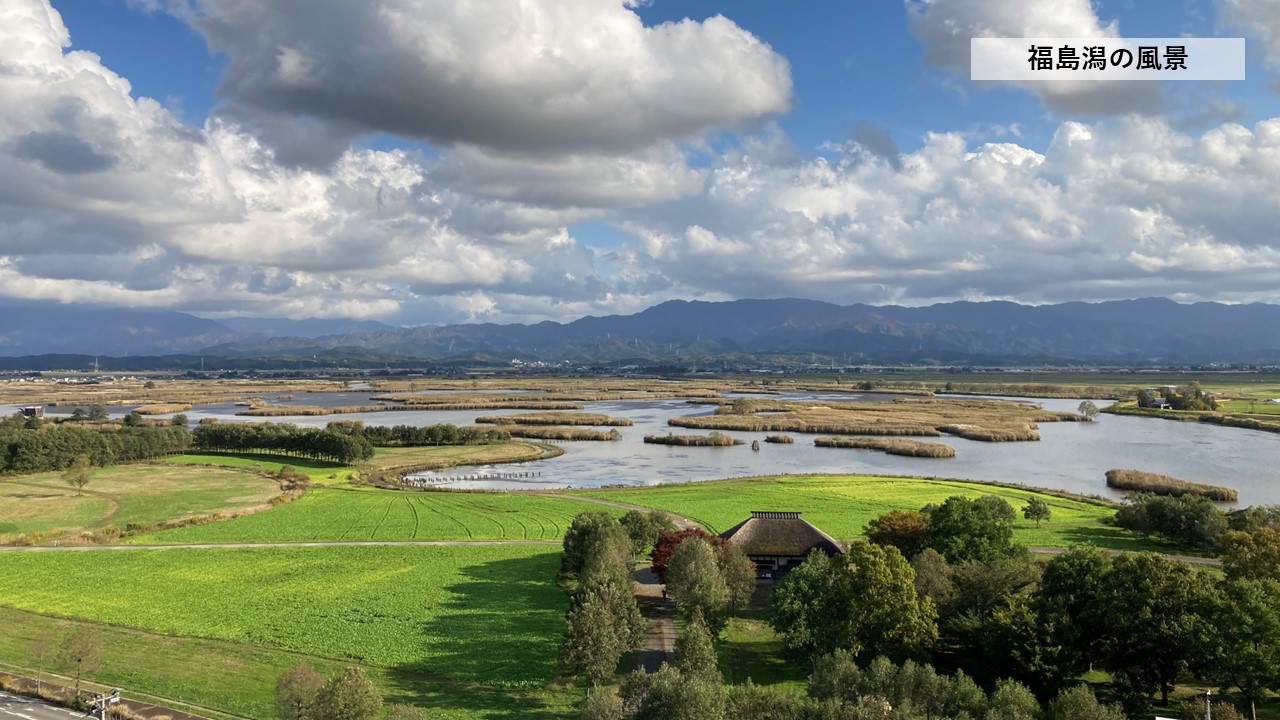
Tanaka: When it's like this, it's more like a lake... but in Niigata we call these lagoons. In the middle of this sprawling (scenery) there is a small building that has been there for 20 years. We now rent that building, and we started brewing sake six months ago.
In all of the seasons, but especially in spring, canola flowers bloom all over the years, creating an amazing, bright yellow landscape. Then in winter, the landscape turns completely white.
In this environment, we make nihonshu sake, doburoku unrefined sake, and more. Recently we have started to make craft sake as well.
However, due to licensing, the nihonshu sake is only for export. For the domestic market, we sell craft sake such asdoburoku unrefined sake.
Kikuchi: Are there some kinds of regulations?
Tanaka: Yes, there are. First off, it's difficult to obtain a license for nihonshu sake. Deregulation began last April (in 2021), which meant we were able to get a license for export only.
Kikuchi: As we can see from the pictures, it's a very nice environment. It's really a lovely place, isn't it?
Tamura: People always say that a place with good water is good for making sake. Is that actually true?
Tanaka: It is. There are a lot of snowy mountains nearby, and the snow that falls during winter melts in spring. That water is used to grow rice, which means it's also incorporated into the sake, which is really important.
Kikuchi: The image I have is that a lot of breweries are historic, but Lagoon Brewery was only founded six months ago.
Tamura: It's not that the generations before you were running a brewery and you wanted to change it during your time, right?
Tanaka: No, I started it completely from scratch. Last April (in 2021), licenses to produce sake for export became available, and now there are six new sake breweries across the country.
Kikuchi: That number will probably increase from here on out, too.
Tanaka: I expect that it will.
Kikuchi: Well, a bit of time has passed, so I'd like Mr. Atsushi to try the sake and hear what he thinks.
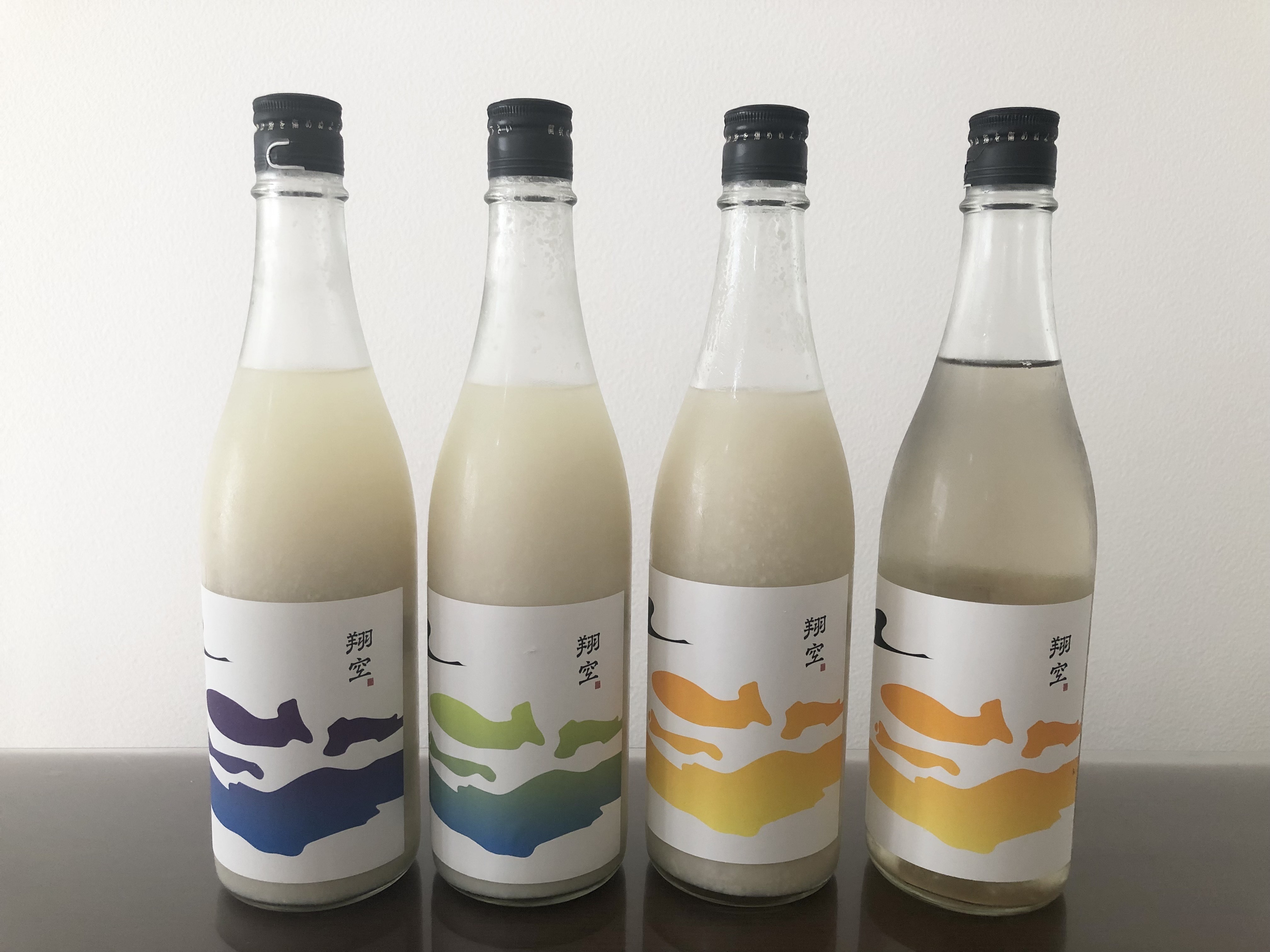
Tanaka: At Lagoon Brewery, all of our products are named "Shouku," which means "soaring in the sky."
The one you have there, with the green label, was released just recently. Citric acid is good for when summer is on the way. Citric acid is in a lot of sour foods, such as lemons, and this sake was made with a kind of koji mold that produces a lot of citric acid.
I think you'll be able to tell if you taste it, but it has a sweet and sour taste that I think is really refreshing in summer. I also think it would be a good sake to pair with seafood.
Tamura: Seafood! I would have prepared some if you had told me! [laughs]
Kikuchi: I guess different kinds of foods pair well with it. Oh, that's nice, your Baccarat glass.
Tanaka: This is the first time Shouku has been poured into a Baccarat glass.
Tamura: I'll give it a taste. Oh, that's good! Haa.... This aroma… I've had a lot of different kinds of nihonshu sake before, but this is a new aroma for me. I guess you could say it's a new approach, I can tell by the scent. Cheers.
Kikuchi: I'm glad to hear that. Have a taste of it from your Baccarat glass.
Tamura: Oh, it's good! This is really good! I can see why it would be perfect for summer. I can definitely taste the acidity, but it doesn't bother me at all. There's something that keeps it from being overpowering... a sweetness envelops the acidity, so the acidity isn't harsh at all. I guess you could say that it's the acidity of naturally-grown fruit. I can't really explain it well, though.
Tanaka: I think that's really accurate, but this isn't nihonshu sake. We can't sell our nihonshu sake domestically.
Usually nihonshu sake is made by fermenting steamed rice and koji mold, but this is made only with koji mold, white koji mold. Koji mold tends to produce a sweetness like glucose, so that sweetness mixed with the acidity creates a very mild sweetness, yet still crisp.
Kikuchi: So, what Mr. Atsushi said was right on the mark.
Tanaka: It was amazing.
Tamura: I definitely want to have this with seafood. I'm tempted to go for something like acqua pazza.
Kikuchi: I guess it can be treated like white wine.
Tamura: Yes, yes. It's like a combination of the good parts of white wine and nihonshu sake, but it still has a proper Japanese flavor.
Kikuchi: That's the best comment to give, isn't it?
Tamura: This does go well in the Baccarat glass. It's just the atmosphere I imagined.
Kikuchi: That was a great decision.
Kikuchi: I think many people are surprised to hear that Shouku is not nihonshu sake, but because of the regulations, this is made in a different way from nihonshu sake, correct?
Tanaka: That's correct. We took on the challenge of making a product that is a little removed from the definition of sake.
Tamura: I like this kind of drink. It's innovative. You're creating something new here with this. I think this kind of flavor would go over well in the domestic market, of course, but also internationally.
Kikuchi: That's an excellent comment.
Tamura: It was probably made to be accepted around the world, right?
Tanaka: Yes, I think that people around the world tend to enjoy flavors and aromas that are easy to grasp. Sweetness and acidity and aroma, they are....
We make our products with the ideals that, rather than some characteristics of nihonshu sake that are difficult to describe, especially Niigata's tanrei karakuchi (light and dry), we aim to create a taste that is easy to grasp.
Tamura: This flavor is one that would make wineries around the world a little jealous. It can be drunk like it's white wine or like it's nihonshu sake. It's really amazing.
Why Mr. Tanaka, Despite Having No Connection to Niigata, Chose to Start Lagoon Brewery

Kikuchi: You said you had no connection to Niigata, so how did all of this start?
Tanaka: I got into the liquor industry a little over ten years ago. When I was around 30 I was working in Tokyo, but I was in the recruiting industry. At the time, a colleague was helping the parent company of a sake brewery in Niigata called Imayo Tsukasa to recruit personnel. He told me that this brewery in Niigata was having a tough time with operations, and that they were looking for their next manager, a young manager. That sounded interesting, so I had my colleague introduce me to Imayo Tsukasa Sake Brewery's parent company, and they asked if I would be interested in becoming a candidate for the next management position. That's how I first made a connection with Niigata.
Kikuchi: So, until then, you had no connection with Niigata at all?
Tanaka: None at all.
Tamura: I see. But how were you able to go that quickly after hearing that they were looking for a new manager?
Tanaka: I think the parent company is amazingly broad-minded. I was just a random person, but they still believed in me and gave me a chance.
Tamura: I see.
Kikuchi: The relationship was based on actually meeting in person, then.
Tanaka: Actually, before joining Imayo Tsukasa Sake Brewery, they said it would be a good idea to get some experience overseas. They figured that nihonshu sake would eventually spread around the world, so they had me go to Singapore for two years. I then came to Niigata directly from Singapore and joined Imayo Tsukasa Sake Brewery.
Tamura: Did you work for a company in Singapore?
Tanaka: One of the group companies of our parent company has a soccer team called Albirex Niigata Singapore. There is a children's team for J-League Albirex in Singapore. There is a professional league for Singapore, and I managed the games, did sales for sponsors, marketing, etc. It was a small company, so I had the opportunity to do a lot of different things.
It seems like it's a completely different industry, but in terms of fan building, I don't think soccer and nihonshu sake are that different.
Kikuchi: You mean making fans of alcohol. So, you think that making fans of the team is similar to that.
Tanaka: Yes, that's right. Also, the words "soccer" and "sake" sound similar.
Tamura: That's completely different. [laughs] I suppose they're close if you write them out.
Kikuchi: It really is amazing, especially since you hadn't been making alcohol before.
Tanaka: It is. I mean, I've always loved alcohol. I've always been a big fan, always loved it. That's one of the reasons why my colleague introduced me to the job.
Kikuchi: What happened between joining Imayo Tsukasa Sake Brewery and establishing Lagoon Brewery?
Tanaka: It's difficult to talk about everything in a short period of time. After joining (Imayo Tsukasa), I was a general manager for the first two years, and after that I was promoted to company president.
Tamura: That's so fast!
Tanaka: It was fast. [laughs] I was surprised too. They told me that it was about time for me to become president, so that's what I did, and I spent eight years in that position.
After about ten years in total had passed, Imayo Tsukasa Sake Brewery had recovered from the difficult business situation, the number of employees had increased a lot, and the brewery had become stable, so I felt like one of my roles had been fulfilled.
Kikuchi: That's amazing. Were you the one who got everything on track, then?
Tanaka: No, it wasn't just me, the other employees were really amazing too. But it did have to do with the timing of getting everything on track and settled. I was the president, but I was a hired president, and the owner was the parent company. My dream was to eventually own my own brewery.
In 2021, the new system that allowed me to obtain a nihonshu sake license, though only for export, was introduced. I figured that the timing was good, so I decided to launch Lagoon Brewery.
Kikuchi: I don't know much about alcohol regulations.
Tanaka: That's understandable. It's not widely known how difficult it is to obtain a new sake license. I'm not sure exactly, but since the liquor tax law was amended in 1953, there has been a supply and demand requirement. In other words, supply and demand have to be in balance, which is difficult to do. Unfortunately, nihonshu sake consumption has continued to decline over the past half century. It's down to less than one-third of what it used to be. The regulations dictate that newcomers cannot enter the market under those conditions.
Kikuchi: So, originally it was a regulation to protect breweries and nihonshu sake owners, but it has actually become very strict.
Tanaka: The purpose is to protect existing breweries, but that means newcomers can't really enter the market. That makes it difficult to create healthy competition, which results in a situation where innovation doesn't readily occur.
Tamura: I think we're entering an era in which, even if we can't call it nihonshu sake, it's actually up to the drinker to decide. For example, you could call this nihonshu sake, you could call it white wine, or you could call it an entirely new kind of drink. I think that if young sake makers can express their products in a variety of ways in a place where this kind of innovation is happening, it will eventually lead to a revival of nihonshu sake culture. What do you think about that?
Tanaka: You're absolutely right. I think that alcohol is a kind of diversity in this new generation. At first we were making refined sake for export.... We started making refined sake for export because we were able to get a license for nihonshu sake, but now we have started making a unique kind of alcohol for domestic use that we're calling "craft sake," and I've started to think that this in itself is really interesting. Brewing sake using not only the traditional koji mold but also rice is something that nihonshu sake breweries can't do, and I think it's an interesting way to expand the fan base. I'm really glad we started doing it.
Tamura: I think it's precisely because young manufacturers like yourself take on new challenges that new sake breweries rooted in the community will be established and grow and pay taxes.
But Mr. Tanaka, I think you're speaking too modestly. Because the world of nihonshu sake is what it is, I think there are some people who won't recognize new endeavors as sake. I think it's really great that you made this (Shouku) without getting discouraged. What were some difficulties you had when getting started?
Tanaka: The people around me have all been very supportive. Also, I have been in the sake business for ten years and built relationships with people who have been doing this for a long time, so I'm surrounded by people who are very understanding of the challenges I face.
But on the national level, it seems that there is a lot of opposition and negativity. Even so, I don't think I have any choice other than to prove that I'm doing something good for the industry.
Tamura: That's right. I think it's jealousy. For trying something new and getting results. I think a lot of people fear and deny things they've never tried or don't know about.
I recently went to Amami Oshima. In Amami Oshima, there is a type of textile called Oshima tsumugi weave. I heard that when young people tried to use the same technique to make something new, the people who make Oshima tsumugi wouldn't recognize what they were doing as Oshima tsumugi. However, when those people were working on that Oshima tsumugi weave with their unique insights, they were approached by Ferrari with an offer, and now their Oshima tsumugi weave is being used for Ferrari seats. And now, the group that had refused to recognize it as Oshima tsumugi weave started to get on board and talk about how great it is.
This, while exercising trial and error in different regions, is the fusion point of the traditions we have preserved and the things that come from moving in a new direction, and those associated challenges. This fusion point is condensed into the taste of this sake (Shozora).
Kikuchi: I see what you mean! This really is a wonderful show!
That’s why you're making nihonshu sake for outside the country, and because of the regulations you're making unrefined sake for the domestic market.
Tanaka: That ties in with what Mr. Atsushi said. Of course we present and sell refined sake to overseas importers and buyers, but there are actually a surprising amount of importers who are interested in unrefined sake. I feel like people from other countries enjoy sake without being bothered about what it should or shouldn't be like. It's very encouraging.
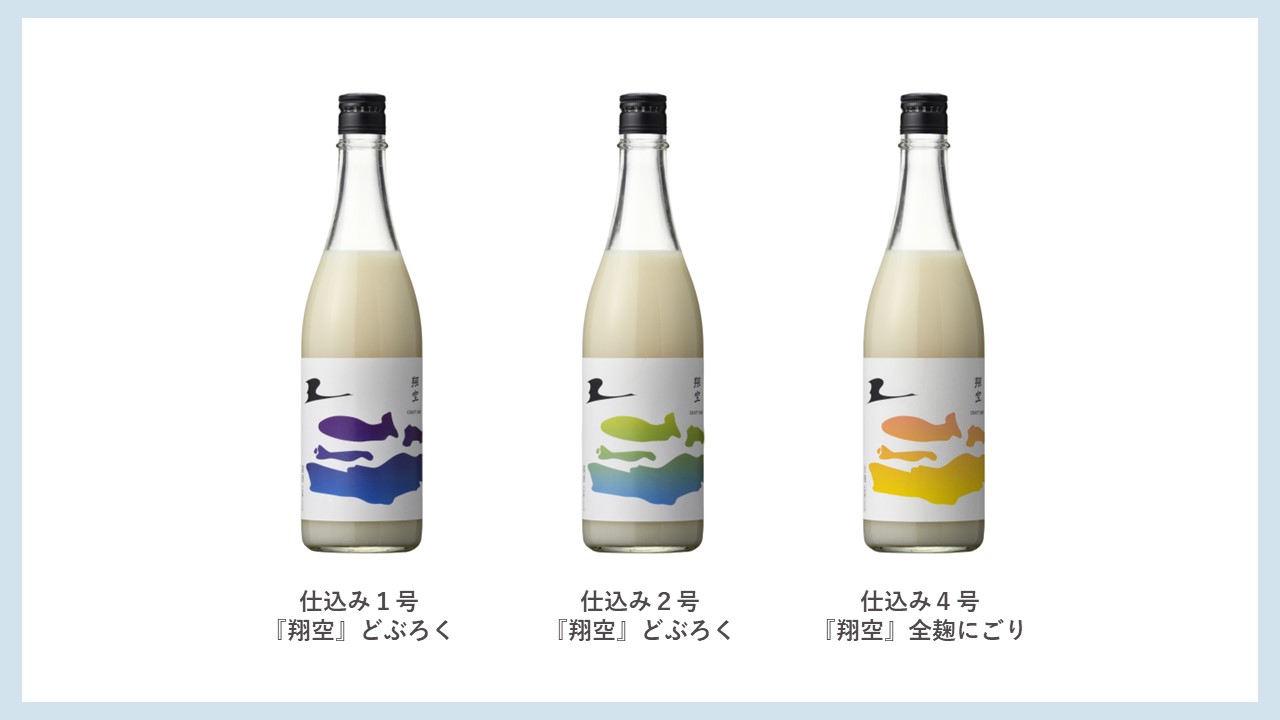
Tamura: I'm not sure I understand the definition of "unrefined sake." Could you explain it again?
Tanaka: It's often referred to as "the ancestor of nihonshu sake." It is said to have been drunk since the ancient Yayoi period. The difference between this and nihonshu sake is whether it is pressed or not, whether it is strained or not. If you press unrefined sake until it's clear, it becomes nihonshu sake.
Tamura: By pressing, do you mean straining?
Tanaka: Yes, it's the same thing.
Kikuchi: So that's about the difference.
Tamura: [tasting] Oh, this is good. I could describe the taste of the one with the green label based on my previous experience, but as for the unrefined sake, it's brand-new for me and I thought it might be like amazake sweet half sake, but it's on a completely different level from amazake. Mmmm, it's good! [laughs]
Tanaka: Most unrefined sake is thick and has both a strong alcohol content and taste. I wanted to keep the light flavor that is typical of Niigata, so I tried to keep it light and make sure it didn't have a strong aftertaste. But it does still retain the fruitiness, and also a bit of gassiness and delicacy.
Tamura: It also seems a little bit carbonated. I'd like to pair it with some different foods. What would pair well with it?
Tanaka: Cured ham.
Kikuchi: It would be nice paired with Western-style items.
Tanaka: It's like wrapping melon in cured ham. They both retain their flavors. I think the oil and saltiness of meat goes well with unrefined sake.
Kikuchi: I wouldn't think to pair unrefined sake with cured ham unless I was told to.
Tamura: Me neither. But I'm sure that when it's finished, the producers make their sake while imagining what it could be paired with and where it will be drunk. I mean, when I asked what kind of food goes with this drink, he immediately answered with cured ham. We really should try drinking this along with cured ham. Then from there you can try arranging it yourself, after you know the base.
I'd actually like to ask people who have tried unrefined sake what kind of foods go with it. How they would describe it.
Kikuchi: [reading the comments section] The people who have tried it say that it's excellent with spicy food.
Tanaka: Curry, for example. Curry is often paired with lassi.
Tamura: It's crisp even though it's delicate, so I don't think it would go very well with strong flavors, but the taste doesn't disappoint.
Tanaka: That's right. The unrefined sake you're drinking now has a high ratio of koji mold, so its distinct sweetness is probably the reason why it's hard to beat.
Sake as a Medium to Represent a Region: Attention to Detail in Sake Brewing

Kikuchi: Does the medium to represent the region extend to what you were talking about earlier?
Tanaka: I believe that locally brewed sake is made by fully utilizing the ingredients of that region, so I think that knowing about locally brewed sake is also connected to knowing about the local climate. I drink nihonshu sake, but I also drink wine, and while I drink I think about the climate where it was made. When I do that, it makes me feel a little like I'm taking a trip at the table. I really like that kind of alcohol.
Kikuchi: Mr. Atsushi, do you drink a lot of different types of alcohol?
Tamura: I do.
Kikuchi: Do you think there will be another boom in nihonshu sake sales?
Tamura: I felt like the fact that it isn't nihonshu sake made me want to drink it. I would definitely recommend it to others, tell them that newcomers are using this kind of approach to make this kind of alcohol. I think it would be really nice for celebrations, to give as a gift.
Kikuchi: Nihonshu sake... I'd like to ask you about your thoughts on diversity in the sake business.
Tanaka: It may sound like I'm repeating myself, but nihonshu sake can only be sent overseas in the first place, and since we make something different domestically, diversity emerges naturally.
The sake that we can produce requires creativity and ingenuity. By adding or removing ingredients usually used in nihonshu production techniques, we make something that isn't defined as nihonshu sake. We can do anything we want, so diversity is created naturally.
Kikuchi: Even though there are some regulations, that doesn't mean you aren't allowed to add something new.
Tanaka: Yes, that's right. So, we haven't done it yet, but for example you can put hops in sake mash, making something that isn't really beer or beer-flavored nihonshu.... There are micro breweries that make sake like that, and there are some that include grapes. Anything goes, so we can enjoy making new flavors in a sort of freestyle fashion.
Tamura: Hm. You make (your sake) from rice, right? So you're saying that if something is compatible with sake rice, in the future someone might take the approach of fusing it with sake rice to make alcohol.
Tanaka: Yes, that's right. You could also add spices and make an alcohol that can be enjoyed like curry.
Also, something I'm testing now is adding pressed tomato juice. Tomatoes and rice, that's like risotto in Italian cuisine. I'm working on it trying to see if I can create that kind of fusion. Tomatoes are a local specialty, and I'd like to make use of them to create a delicious kind of alcohol.
There are a few sake breweries in Japan like mine, and everyone at them is working hard and thinking about new things. It's wonderful.
Tamura: Is there a horizontal network?
Tanaka: Yes, actually there is. There are plans to form an association with horizontal connections at the end of this month (June 2022) starting with six companies.
Tamura: Wow, that's great.
Kikuchi: The packaging of this sake is associated with the local region too, isn't it?
Tanaka: That's right. This is what Fukushima Lagoon looks like from above. It's a little deformed, but it's somewhat like a bird's eye view.
A particularly large amount of migratory birds come here, so the birdsongs you can hear change throughout each of the seasons.
Tamura: Kikuchi, you don't drink alcohol, do you?
Kikuchi: No, I can't drink at all, so I'm really glad there are so many great things about this place in addition to the alcohol. [laughs]
They even have a café there as well, and they serve things like tomato soft-serve ice cream. Even kids or people who don't drink will definitely be able to enjoy their time here, and I'm glad I was able to come.
Mr. Tanaka's Vision for the Future
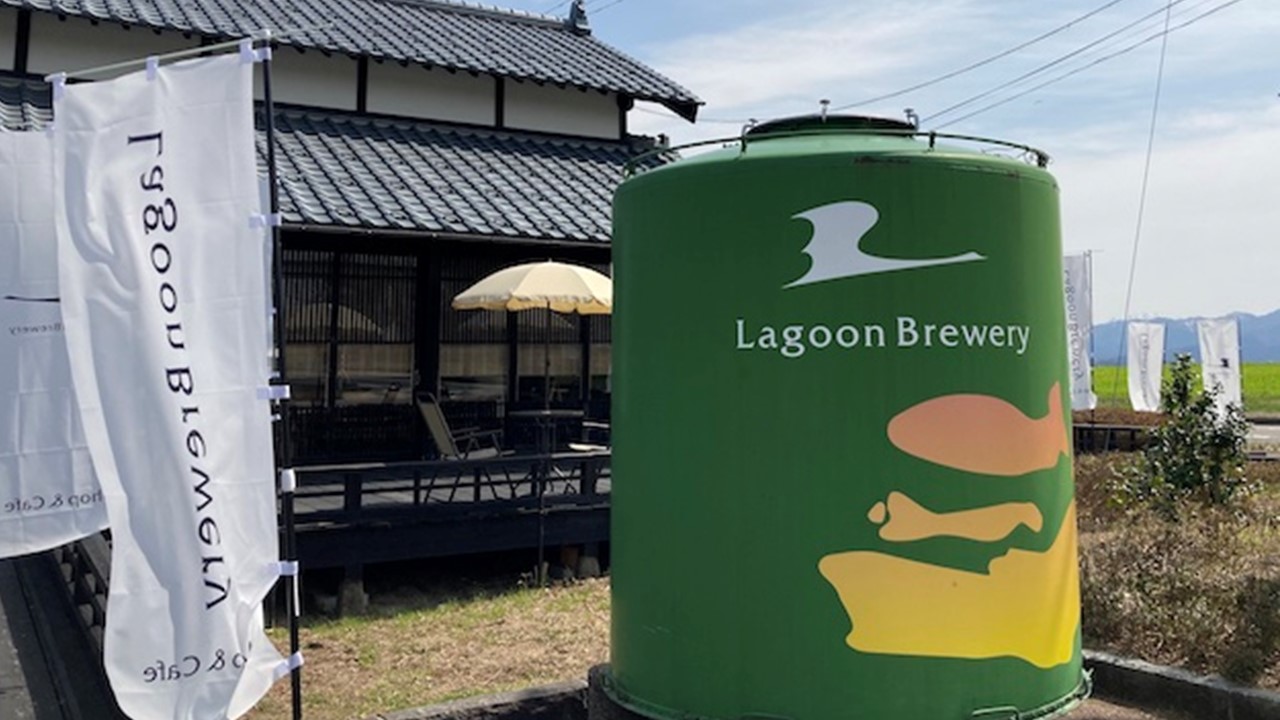
Kikuchi: Do you have a clear vision for the future?
Tanaka: I do. First, I would like to establish a style of sake production on a small scale. There is a surprising amount of people who want to start brewing sake. I've only been doing this for six months, but I've had quite a few people come to me saying that they want to brew sake too, they want to learn too. I think there are probably a lot of people like that all over the country, so I'd like to establish a style that would make it easy for them to get started. That way, a lot of ambitious people across the country who have interesting ideas will make small sake breweries. This will bring diversity to sake, allowing the industry to thrive. That's what I'd like to happen.
Kikuchi: It's certainly not easy to make a sake brewery on your own.
Tanaka: It's not. But I would like to show people that it can be done with hard work.
●Brewery Tour
Kikuchi: This is usually the café space, and behind here you can see the brewery. My impression of sake breweries wasn't that they were this small. Is there anywhere inside you can show us?
Tanaka: Yes, let's take a look.
[guests move to the brewery space]
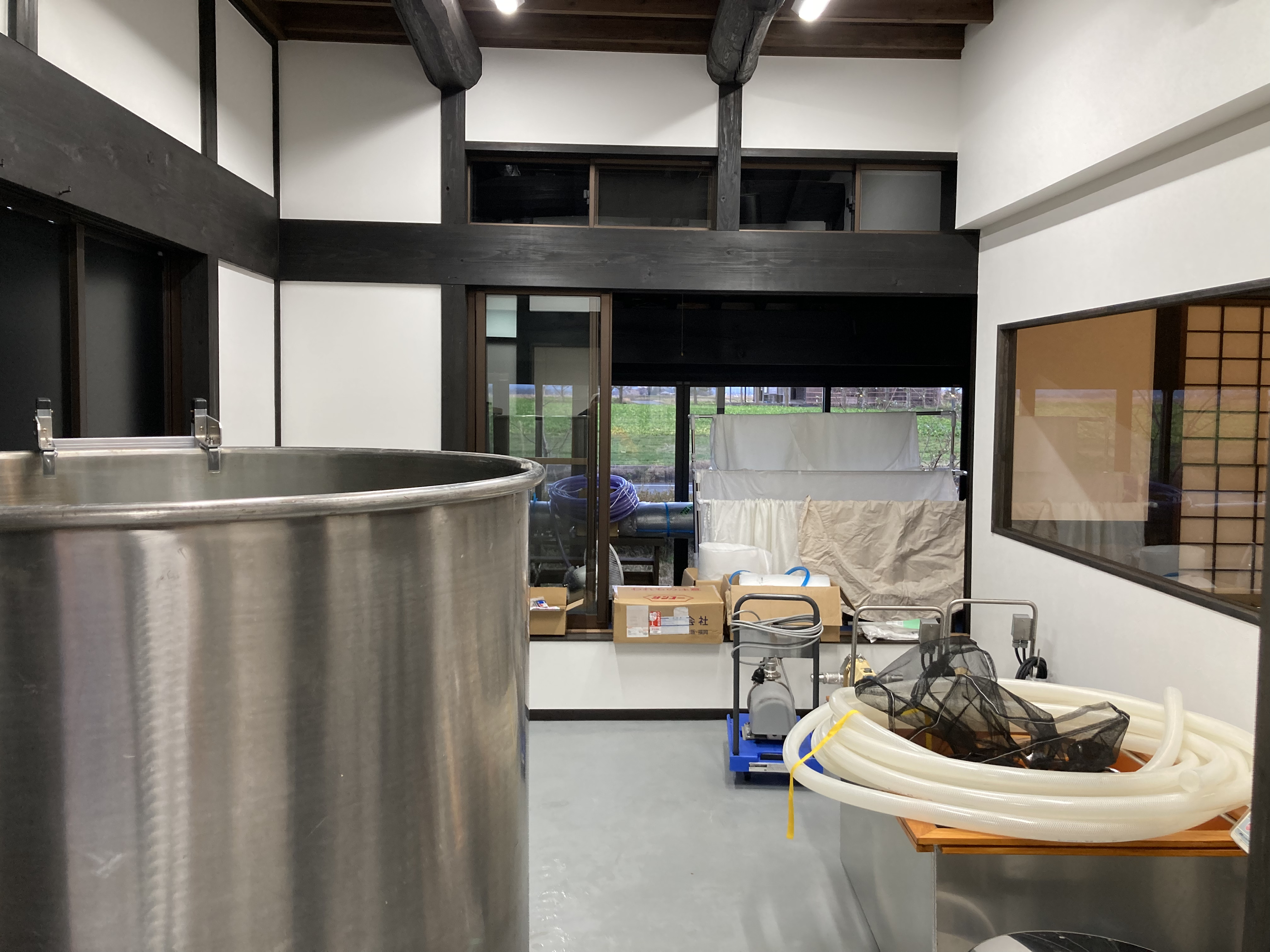
Kikuchi: My impression of sake breweries is that they are very large, but this is quite a small place.
Tanaka: We rent this place, but we chose it because it has a high ceiling and we figured it would be suitable for sake brewing.
Tanaka: This is the fermentation room with all of the tanks. Would you like to take a look?
Kikuchi: It smells more fruity than alcoholic.
Tanaka: It's a little like bananas. If you drink it as is, it's unrefined sake; if you press it, then it's nihonshu sake.
Tamura: What is that process now?
Tanaka: Fermentation. Right now it's in the sake mash state, so around three weeks... about one more week. This will bring the alcohol content up to 17-18%. It's the process of extracting the sugar from the rice and allowing the yeast to consume it and grow.
[guests move to another room]
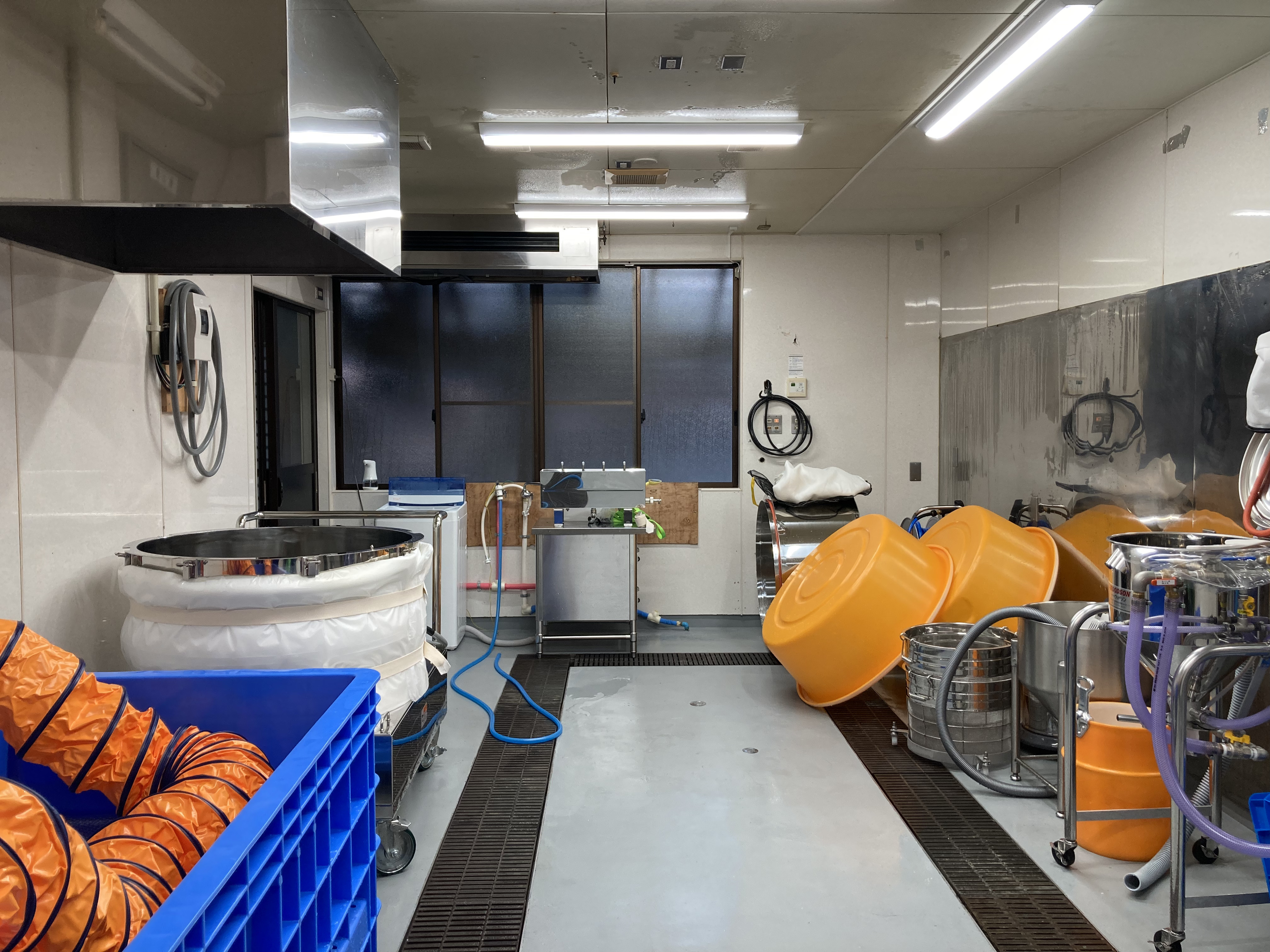
Tanaka: This manufacturing site is only about 66 square meters, so it's really compact. This place actually used to be a restaurant. This was the kitchen, but we're remodeling it.
We didn't do all that much remodeling, but this, for example, is the bottling machine. The finished sake is put into bottles, just the right amount to be filled.
Kikuchi: It really is done by hand, and it's very individual.
Tanaka: This is the machine that steams the rice. It's called a koshiki (steamer). I'm actually going to steam rice first thing tomorrow morning.
Tamura: What is the orange tub?
Tanaka: It's called a hangiri. I often use it for washing dishes. Most of the brewing process is cleaning or washing. It's really just a lot of straightforward work.
Tamura: Are these tubs sold on Amazon?
Tanaka: Amazon doesn't sell tubs this big.
[guests move to another room]
Tanaka: This machine is for pressing sake.
Tamura: So when you add the unrefined sake (from the other room), it becomes clear and turns into nihonshu sake.
Tanaka: That's right. We don't put it in as is, though. We put it in bags and put a lot of bags (in the machine). Then, we pressurize it from the top.
This one is very small. Usually sake breweries have much larger machines.
Tamura: You really can make (sake) in this space.
Tanaka: You should try making (sake) too, Mr. Atsushi. It does take up this much space, though. [laughs]
Tanaka: It goes all the way to the back, just for a moment.
Tamura: That's a method that traditional sake breweries don't use. But you do it.
Tanaka: Sake breweries have been around for a long time, and within that long history there were periods during which sake sold really well, so they were able to expand a lot.
[guests return to their seats]
Kikuchi: It's really amazing that you make it in this one area. Before, I had the impression that it was a bit uptight, that someone would get angry if people went in.
Tanaka: We operate in a free atmosphere.
●An Introduction to Brewery Share Ownership
Tanaka: Regarding the one-year course, I would say that you would be watching over the growth of a brand-new brewery. Really, we're working to improve our skills every time (we try something new) and we're continuing to make improvements, so I do hope you'll keep an eye on us over the course of the year.
Tamura: You're right. I know about you right from your first year. When ten years have passed, I'll be able to tell you what (the sake) tastes like now versus what it tasted like during the first year, or the second year.... I think that being able to support a brewery from its very first year is the kind of timing that doesn't come along very often during your lifetime.
Kikuchi: That's right. This is a valuable opportunity, and I hope everyone will join us. It means that the types of alcohol and the drinks we have now will continue to evolve.
Tanaka: I am hoping that, in a year's time, I will be able to make an alcohol that really takes off, and I'm anticipating good things.
Tamura: What you have now are still some impressive drinks. Your intent as a creator comes through clearly, and I think that this sake will bring smiles to the faces of everyone it reaches.
Tanaka: Thank you so much.
A Message From the Guests
Yosuke Tanaka, representative of Lagoon Brewery
I think it's rare to see breweries that were just recently established, so we hope you will support our growth from the very beginning. Thank you very much.
Atsushi Tamura of comedy duo London Boots Ichi-go Ni-go
During this broadcast, I felt like there is something beyond sake, and I'm full of excitement and anticipation for the new kinds of sake that are being created.
I'm interested in the kind of sake you make, and I'm also interested in what the people who drink your sake say, for example if they think of a new way they'd like to make sake. I think it's something that allows creators to make other creators. I'm really glad to have been able to be a part of this excellent turning point in the bright future of sake.
Also, I haven't finished drinking all of this (bottle) yet, so tomorrow I think I'll buy some prosciutto and drink some more. [laughs] Here in Tokyo, I'm glad I was able to be a part of this wonderful discussion and taste this sake that was made through various trials and errors. Thank you very much.
The Pocket Owners "One Year Support Plan" provides regular updates on Lagoon Brewery's activities during the year. Additionally, a set of Shouku (doburoku unrefined-type craft sake) selected by representative Yosuke Tanaka will be delivered seasonally.
The Pocket Owners "Summer Owner Plan" provides regular updates on Lagoon Brewery's activities from July through September. Additionally, a set of three bottles of Shouku (doburoku unrefined-type craft sake) selected by representative Yosuke Tanaka will be delivered in July.
We recommend this plan for those who would like to casually try out brewery share ownership.
Sponsored Links
Unmissable Tours
Expand your horizons by interacting with diversity. Take a look at guided tours on which you can connect personally with the guides and have truly extraordinary experiences.
Search


